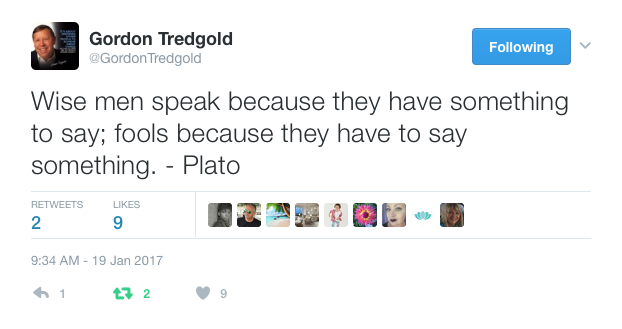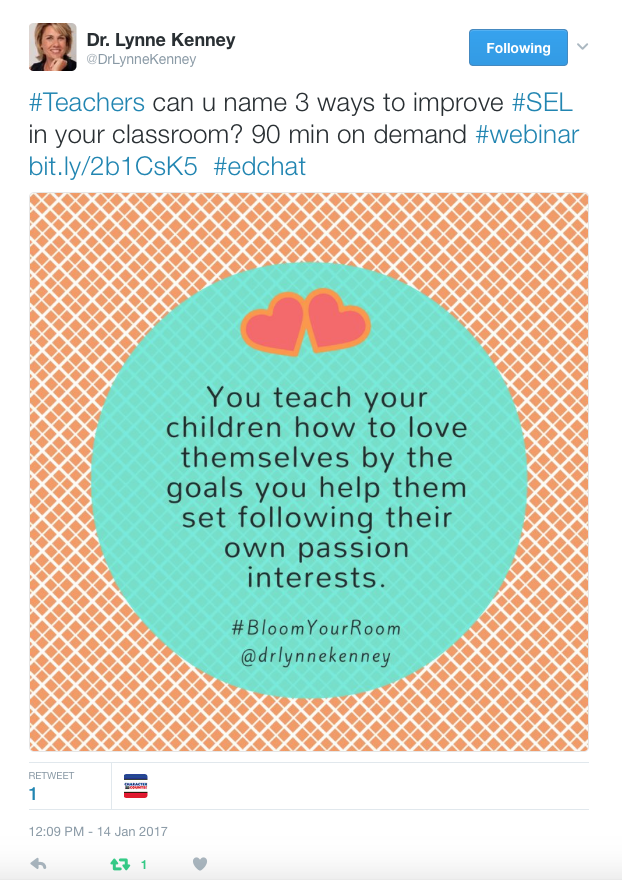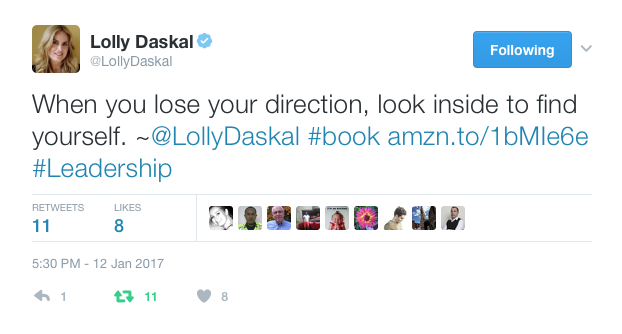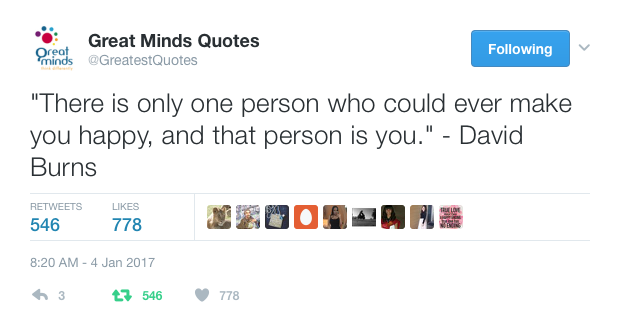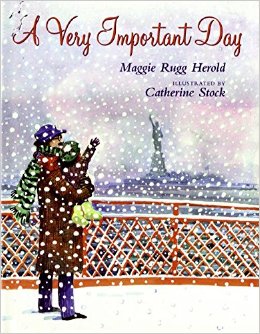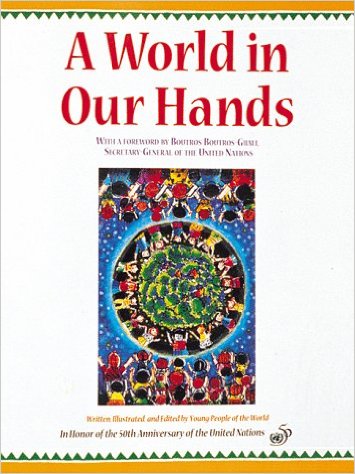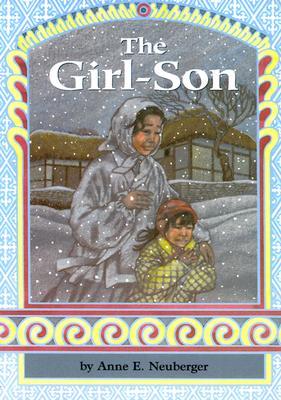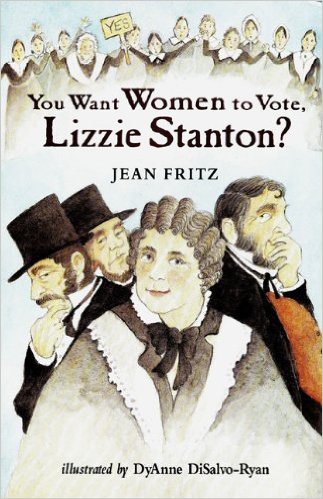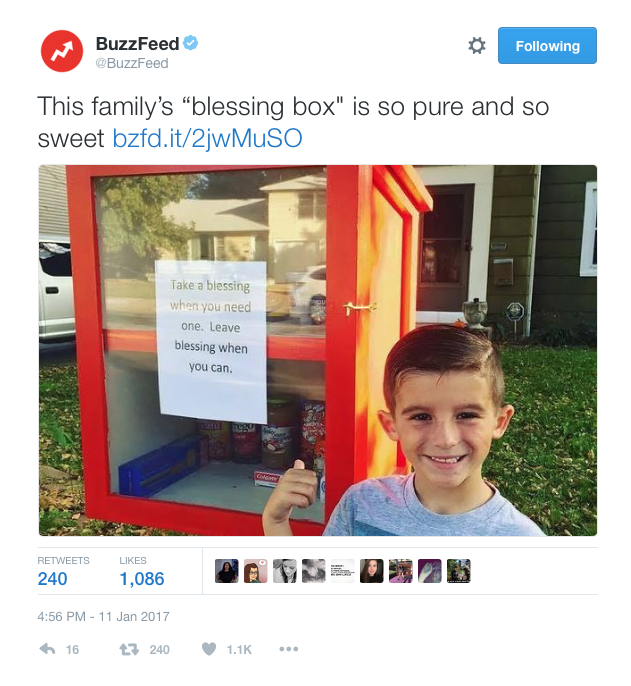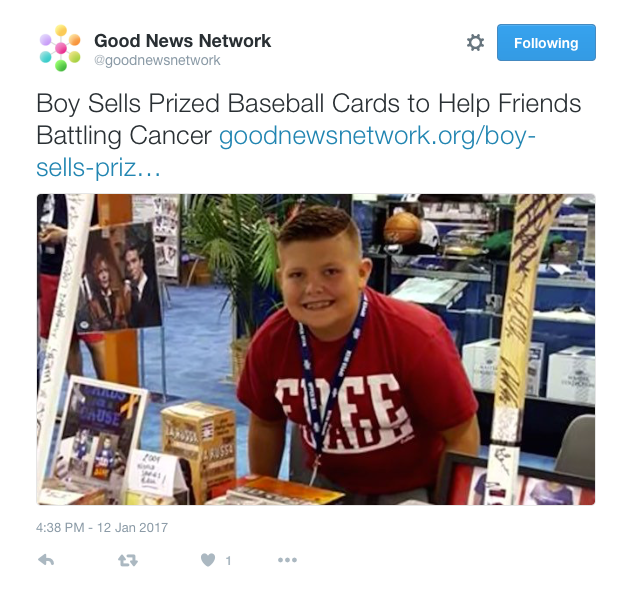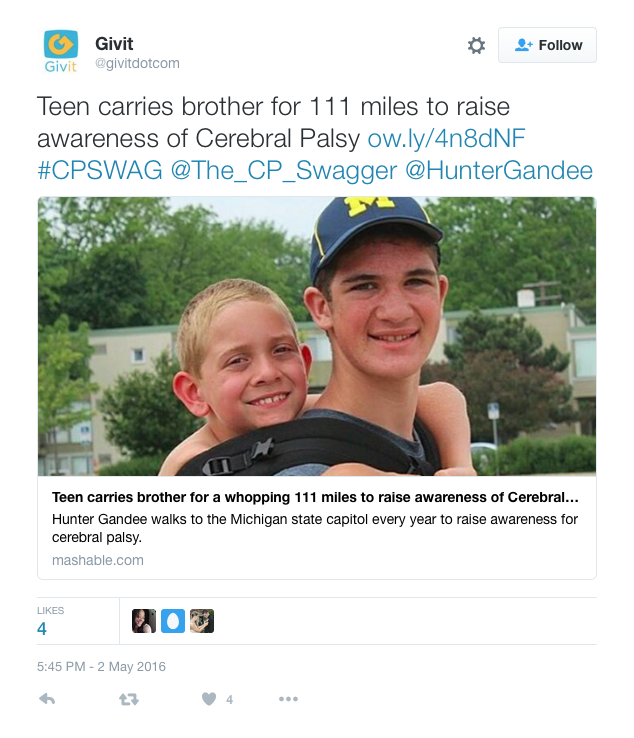Mean tweets didn’t stop this player
Former Iowa State kicker Cole Netten put together a video of mean tweets sent to him throughout his seasons as a Cyclone, followed by the post-season awards he won. He captioned the video, “Y’all made me work harder. Thank you.”
Persevering is achieving something despite the obstacles that may have gotten in the way. Instead of focusing on the negative things people were saying about him, Netten persevered and graduated as the school’s best-ever kicker.
Y'all made me work harder. Thank you. pic.twitter.com/GhcijBwBm7
— Cole (swollnetts) (@swollnetten) January 11, 2017
6 ways to know that it’s time for a course correction

From our guest contributor, Frank Sonnenberg.
Some people measure success by the wealth they’ve accumulated, the power they’ve attained, or the status they’ve achieved. Yet, even though they’ve reached success beyond their wildest dreams, they still have an empty feeling — something is missing from their life.
In order to fill that void and be completely fulfilled in life, their soul may be searching for something more.
Here are a few scenarios that describe this emptiness:
Lonely at the top. I was obsessed with making it to the top. When I arrived, however, I learned that it wasn’t all it was cracked up to be. I now realize that my continual pursuit of advancement seriously compromised my ability to spend quality time with my family and build meaningful relationships with friends.
Enough is never enough. One of the ways I kept score in life was to compare my toys to my neighbors’ toys. It felt good for a while, but each “high” just didn’t last. I now know better. I realized that if I’m not careful, the game of life can become an obsession — there will always be people with more and less than I have.
Sold my soul. I would have given anything to be a success. I lied, cheated, and sold my soul to the devil. I understand now that although I’ve obtained fame and fortune, people don’t like or respect me. Knowing what I’ve done, I find it hard to live with myself, and others seem to agree.
All work and no play. I was always the first person in the office and the last one to leave. While my business life has been a roaring success, my personal life has been a disaster. I realize there’s got to be more to life. Balance matters, and I must be the one to make it happen.
Pleased everyone except myself. I never made a move without first seeking the approval of my friends and family. They’re happy, but I’m miserable. I now appreciate that my opinion matters too, and counting on others to make up my mind for me is just a cop-out. After all, it’s my life and I own it.
Lived in the future rather than the present. I spent much of my life thinking about what I was going to do tomorrow. Now that I’m older, I’ve come face-to-face with the reality that my days won’t go on forever; I wish I had learned to savor every special moment as it happened.
If any of these scenarios sound familiar to you, it may be time for a course correction.
The purpose of life is a perpetual question that has intrigued mankind since the beginning of human existence. Success in life begins with purpose. When you achieve clarity, you’ll gain a new perspective on your life. When you find your purpose, you’ll feel good about who you are, what you stand for, and where you’re heading. When you discover your purpose, an inner peace will replace the need to seek approval from others. And friends and family will begin to sense a new you: someone who is happy, motivated and self-assured — a person with a mission. People will say that there’s something really special about you. And, they’ll be right! As Robert Byrne, author, once said, ‘The purpose of life is a life of purpose.’ It isn’t too late to start.”
This is an excerpt from Follow Your Conscience by Frank Sonnenberg, © 2017 Frank Sonnenberg. All rights reserved.
 Frank is an award-winning author. He has written six books and over 300 articles. Frank was recently named one of “America’s Top 100 Thought Leaders” and one of America’s Most Influential Small Business Experts. Frank has served on several boards and has consulted to some of the largest and most respected companies in the world. Additionally, FrankSonnenbergOnline was named among the “Best 21st Century Leadership Blogs” and among the “Top 100 Socially-Shared Leadership Blogs.” Frank’s newest book, BOOKSMART: Hundreds of real-world lessons for success and happiness, was released November, 2016 © 2017 Frank Sonnenberg. All rights reserved.
Frank is an award-winning author. He has written six books and over 300 articles. Frank was recently named one of “America’s Top 100 Thought Leaders” and one of America’s Most Influential Small Business Experts. Frank has served on several boards and has consulted to some of the largest and most respected companies in the world. Additionally, FrankSonnenbergOnline was named among the “Best 21st Century Leadership Blogs” and among the “Top 100 Socially-Shared Leadership Blogs.” Frank’s newest book, BOOKSMART: Hundreds of real-world lessons for success and happiness, was released November, 2016 © 2017 Frank Sonnenberg. All rights reserved.
Books to help teach citizenship
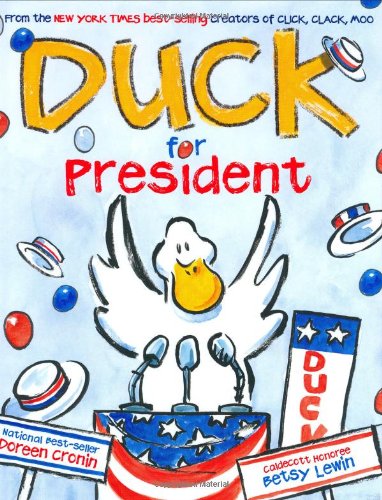 Duck for President by Doreen Cronin and illustrated by Betsy Lewin
Duck for President by Doreen Cronin and illustrated by Betsy Lewin
Best for: Grades K-2
ISBN-13: 978-0689863776
My fellow Americans: It is our pleasure, our honor, our duty as citizens to present to you Duck for President. Here is a duck who began in a humble pond. Who worked his way to farmer. To governor. And now, perhaps, to the highest office in the land. Some say, if he walks like a duck and talks like a duck, he is a duck. We say, if he walks like a duck and talks like a duck, he will be the next president of the United States of America. Thank you for your vote.
View on Amazon View on Scholastic
A Very Important Day by Maggie Rugg Herold
Best for: Grades K-3
ISBN-13: 978-0688130657
On a snowy New York City morning, families who have journeyed to the United States from many different countries take the oath of citizenship at a downtown courthouse.
View on Amazon View on Scholastic
My Fellow Americans: A Family Album by Alice Provensen
Best for: Grades 2-6
ISBN-13: 978-0152766429
Alice Provensen creates an album that reveals the words and deeds of fellow Americans in elegant pictures brimming with lively detail. An eclectic sampling of Americans is represented-from Pocahontas to Henry Ford, Sojourner Truth to Jim Henson, and Al Capone to Dr. Seuss. By showing us the myriad personalities who have influenced our lives, Mrs. Provensen provides remarkable insight into what it means to be a part of the American family.
A World in Our Hands: In Honor of the 50th Anniversary of the United Nations by Young People of the World Staff
Best for: Grades 4-6
ISBN-13: 978-1883672317
The only official United Nations’ Fiftieth Anniversary book written and illustrated entirely by children from around the world explores the mission of the UN and what role kids can play in making the world a better place.
Thunder at Gettysburg by Patricia Lee Gauch
Best for: Grades 4-6
ISBN-13: 978-0553159516
Fourteen-year-old Tillie is sent to accompany a neighbor to Weikert’s farm when the fighting at Gettysburg gets too close to home, but finds herself trapped in the battle that raged for three days, from July 1-3, 1863.
View on Amazon View on Scholastic
The Girl-Son by Anne E. Neuberger
Best for: Grades 6-8
ISBN-13: 978-1575050775
A story based on the life of Induk Pahk, a Korean educator, whose widowed mother disguised her as a boy at the age of eight in order for her to attend school, a choice forbidden to girls in the early twentieth century in that country.
View on Amazon View on Scholastic
You Want Women to Vote, Lizzie Stanton? by Jean Fritz
Best for: Grades 6-8
ISBN-13: 978-0698117648
With her trademark humor and anecdotal style, the Newbery Honor Award-winner and preeminent biographer for young people turns her attention to Elizabeth Cady Stanton, the lively, unconventional spokeswoman of the woman suffrage movement. Convinced from an early age that women should have the same rights as men, Lizzie embarked on a career that changed America.
Helping kids who fear failure

From our guest contributor, Michele Borba
One of the inevitable facts of life is that everyone makes mistakes. Granted, some mistakes are more significant than others and harder to get over, but they are a part of life. How individuals deal with those mistakes is significant to their self-esteem.
There are many ways parents can help erase the idea that “mistakes are bad.” Keep in mind that changing behavior takes time and consistency. Finally, remember that your own way of dealing with mistakes is the most important lesson your child can ever leam on the subject. What follows are some suggestions to help your child erase the fear of making mistakes:
Make Mistakes “OK”
Tell Your Child, “It’s OK to make a mistake.” Too many children are suffering from perfectionism. They try to be perfect. When a mistake happens (as it’s bound to from time to time) the child is devastated and interprets this as meaning he/she is “unworthy.” Every now and then, tell your child, “It’s OK to make mistakes. It happens to all of us.”
Admit Your Own Mistakes
It is important for parents to admit they do make mistakes. Children see you as “all powerful and all knowing.” Obviously, parents do make mistakes, but, often-times, they keep them to themselves. Tell your child a mistake you’ve made recently. Discuss a mistake you remember making as a child.
Model Turning Your Mistake Around
Yes, parents make mistakes, but high-achieving individuals learn from their errors. As you admit your mistake, remember to tell your child what you will do differently the next time. You could say, “I made the mistake of… and this is what I’ll do instead….”
Share Mistakes of Famous Individuals
Anytime the opportunity arises, point out a mistake made by a famous individual so that your child recognizes mistakes happen to everyone. Books are rich with sources. Newspapers always have fresh ideas. Here are a few examples you could use:
- Abraham Lincoln: Defeated for public office eight times before being elected President of the United States.
- Wright Brothers: Took seventy times to get the Kitty Hawk off the ground.
- Louisa May Alcott: Told by countless publishers that no one would ever read Little Women.
- Babe Ruth: The year he hit the most home runs he had the most strike-outs.
- Beethoven: Told by his music teacher that he was hopeless as a composer.
- Michael Joran: Cut from his high school basketball team.
- Walt Disney: Fired by a newspaper editor for “lacking great ideas.” Went bankrupt several times and was told repeatedly to “get rid of the mouse because there’s no potential in it.”
- Thomas Edison: Was told by his teacher that he was too stupid to learn anything.
- Charles Darwin: Did poorly in his early grade and even failed a university medical course.
- Woodrow Wilson: A Rhodes Scholar and President of the Uniter States didn’t learn the alphabet util he was eight and didn’t read until he was eleven.
- Albert Einstein: Did not talk until age four or read until age nine. He failed his college entrance exams.
- Wilma Rudolph: Contracted polio at age four, crippling her as a child. She was told she would never walk but decided to become a runner. She went on to win three Olympic gold medals and was named the “Fastest Woman in the World.”
Help Your Child Learn Positive Self-Talk
If you notice your child is very tense and concerned about making mistakes, help him/her learn to say inside his/her head a positive, affirming statement such as “I am calm and in control” or “I will try my best.” The more your child says the statement, the more he/she will begin to believe it.
Help Your Child Label the Mistake as the Problem, Not Himself
Often, the most self-devaluing part of making mistakes is not the mistake, but how the child chooses to interpret the error. Help your child admit he/she made a mistake (“I got this one wrong”) and then help him/her label the mistake as the problem and not himself/herself (“I forgot the the capital of Nevada”).
Plan a Strategy for Next Time
After your child can admit the mistake and relabels the mistake as the error (not himself/herself), the final step is to develop a plan for next time: “This is what I’ll do differently next time. I’ll study the capitals ten minutes a night for the next two weeks.”
 Dr. Michele BorbaMichele Borba is an educational psychologist, parenting expert, TODAY show contributor and author of 22 books including The Big Book of Parenting Solutions: 101 Answers to Your Everyday Challenges and Wildest Worries and UnSelfie: Why Empathetic Kids Succeed in Our All-About-Me World.
Dr. Michele BorbaMichele Borba is an educational psychologist, parenting expert, TODAY show contributor and author of 22 books including The Big Book of Parenting Solutions: 101 Answers to Your Everyday Challenges and Wildest Worries and UnSelfie: Why Empathetic Kids Succeed in Our All-About-Me World.
Check out: micheleborba.com or follow her on Twitter @micheleborba.
Live backwards

From our guest contributor Michael Josephson.
Ben just came to town as a new rabbi. Unfortunately, his first official duty was to conduct a funeral service for Albert, a man who died in his eighties with no relatives. Since Ben didn’t know the deceased personally, he paused from his sermon to ask if anyone in the congregation would say something good about Albert. There was no response. Ben asked again: “Many of you knew Albert for years, surely someone can say something nice.” After an uncomfortable pause, a voice from the back of the room said, “Well, his brother was worse.”
If you died tomorrow, what would people say about you? Would it make you proud of the way you lived and the choices you made? Thinking about the legacy we leave can help us keep our priorities straight. Few people would be satisfied with an epitaph like: “She always got what she wanted.” Or “He never missed a deadline.”
There’s an old saying, “If you want to know how to live your life, think about what you’d like people to say about you after you die . . . and live backwards.” The idea is that we earn our eulogy by our everyday choices.
In his book, When Everything You Ever Wanted Isn’t Enough, Harold Kushner writes: “Our souls are not hungry for fame, comfort, wealth, or power. Our souls are hungry for meaning, for the sense that we have figured out how to live so that our lives matter, so that the world will be at least a little bit different for our having passed through it.”
 Michael Josephson is an influential and internationally renowned champion of character education for youth and ethical conduct in business, government, policing, journalism, sports, healthcare and law. He is credited by many as the person most responsible for reviving and professionalizing the character education in school and youth-serving organizations. In 1992, under the auspices of the Josephson Institute he created CHARACTER COUNTS!, the world’s most widely implemented character development initiative based on a common language of shared values – the Six Pillars of Character) and Pursuing Victory With Honor (1996), a companion program promoting ethics in sports.
Michael Josephson is an influential and internationally renowned champion of character education for youth and ethical conduct in business, government, policing, journalism, sports, healthcare and law. He is credited by many as the person most responsible for reviving and professionalizing the character education in school and youth-serving organizations. In 1992, under the auspices of the Josephson Institute he created CHARACTER COUNTS!, the world’s most widely implemented character development initiative based on a common language of shared values – the Six Pillars of Character) and Pursuing Victory With Honor (1996), a companion program promoting ethics in sports.

